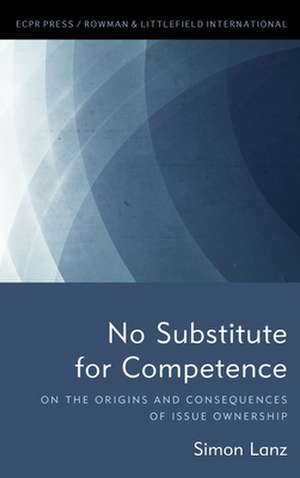No Substitute for Competence
Autor Simon Lanzen Limba Engleză Paperback – 14 sep 2021
| Toate formatele și edițiile | Preț | Express |
|---|---|---|
| Paperback (1) | 251.38 lei 6-8 săpt. | |
| Rowman & Littlefield – 14 sep 2021 | 251.38 lei 6-8 săpt. | |
| Hardback (1) | 476.61 lei 6-8 săpt. | |
| Rowman & Littlefield – 7 ian 2020 | 476.61 lei 6-8 săpt. |
Preț: 251.38 lei
Nou
Puncte Express: 377
Preț estimativ în valută:
48.12€ • 52.28$ • 40.44£
48.12€ • 52.28$ • 40.44£
Carte tipărită la comandă
Livrare economică 21 aprilie-05 mai
Preluare comenzi: 021 569.72.76
Specificații
ISBN-13: 9781538156889
ISBN-10: 1538156881
Pagini: 156
Dimensiuni: 161 x 229 x 19 mm
Greutate: 0.24 kg
Editura: Rowman & Littlefield
ISBN-10: 1538156881
Pagini: 156
Dimensiuni: 161 x 229 x 19 mm
Greutate: 0.24 kg
Editura: Rowman & Littlefield
Descriere
For the first time, this book provides a systematic analysis of the origins and consequences of party competence evaluations. It demonstrates that perceptions of issue-handling competence are universal and independent drivers of the vote choice and that issue voting is not necessarily prerogative of the well informed.
Cuprins
1. Introduction
2. Perspectives on Issue Voting and Issue Ownership Voting
3. The Role of Competence Evaluations in Elections
4. Empirical Framework
5. The Sources of Issue Ownership
6. Issue Ownership Voting
7. Issue Ownership Voting Across Contexts
8. Conclusion
